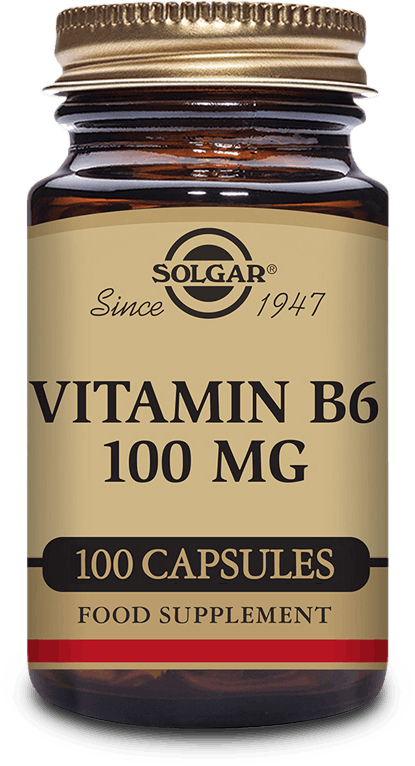Vitamin B6 Pyridoxine
Vitamin B6, also known as pyridoxine, is a water-soluble nutrient essential for over 100 enzymatic reactions in the human body. It plays a pivotal role in amino acid metabolism, neurotransmitter synthesis (like serotonin and dopamine), and immune function by supporting lymphocyte production. Unlike fat-soluble vitamins, B6 isn’t stored in the body long-term, requiring regular dietary intake or supplementation. Research highlights its efficacy in managing nausea during pregnancy and reducing symptoms of premenstrual syndrome (PMS). However, both deficiency and excessive intake can lead to neurological complications, underscoring the importance of balanced consumption.
Key Facts
- Vitamin B6 supports neurotransmitter production, influencing mood regulation and cognitive health.
- It aids in haemoglobin synthesis, helping prevent microcytic anaemia.
- Deficiency can cause dermatitis, glossitis (swollen tongue), and peripheral neuropathy.
- High-dose supplementation (over 100 mg/day) may lead to sensory neuropathy and balance issues.
- Primary dietary sources include poultry, fish, chickpeas, and fortified cereals.
- Symptoms of toxicity are often reversible upon discontinuing supplements.
What does the research say about Vitamin B6 and its function in the body?
Vitamin B6 is critical for metabolising proteins, fats, and carbohydrates, and it supports immune health by promoting lymphocyte activity. Studies show it helps alleviate pregnancy-related nausea and PMS symptoms, though evidence for other uses, like anxiety reduction, remains inconclusive. Its role in homocysteine regulation also links it to cardiovascular health.
What are the primary food sources of Vitamin B6?
Rich sources include poultry (chicken, turkey), fish (salmon, tuna), potatoes, bananas, and legumes like chickpeas. Fortified cereals and sunflower seeds are excellent plant-based options. Cooking methods affect retention—steaming preserves B6 better than boiling.
How can I supplement Vitamin B6?
Supplements typically contain pyridoxine hydrochloride or its active form, pyridoxal 5’-phosphate (P5P). Dosages range from 1.3–1.7 mg/day for adults, with higher amounts (up to 100 mg/day) used under medical supervision for specific conditions. Always consult a healthcare provider before starting high-dose regimens.
What are the main symptoms of Vitamin B6 deficiency?
Deficiency can cause seborrheic dermatitis, cracked lips, and glossitis. Neurological symptoms include numbness, tingling in extremities, confusion, and seizures in severe cases. Prolonged deficiency may lead to microcytic anaemia due to impaired haemoglobin production.
Are there any known side effects of supplementing Vitamin B6?
Excessive intake (over 100 mg/day) can trigger sensory neuropathy, characterised by numbness and balance problems. Long-term use of high doses may cause irreversible nerve damage, though most symptoms resolve after discontinuing supplements. Stick to recommended limits unless advised otherwise by a clinician.
How long does it take to see the benefits of Vitamin B6 supplementation?
Improvements in nausea or PMS symptoms may appear within days. Addressing deficiency-related issues like anaemia or dermatitis typically takes weeks, depending on severity. Neurological symptoms from toxicity may improve within months of stopping supplements.
What should consumers look for on the supplement label when supplementing Vitamin B6?
Opt for products listing pyridoxal 5’-phosphate (P5P), the active form better absorbed by the body. Check for third-party testing seals (e.g., USP) to ensure quality. Avoid mega-doses unless prescribed—most adults need only 1.3–1.7 mg daily.
Can Vitamin B6 improve mood disorders like depression?
B6 aids in producing serotonin and GABA, neurotransmitters linked to mood regulation. While some studies suggest low B6 levels correlate with depression, evidence supporting supplementation as a standalone treatment remains limited. A balanced diet and medical guidance are recommended for mood-related concerns.
Is Vitamin B6 safe during pregnancy?
Yes, in recommended doses (under 100 mg/day). It’s widely used to manage morning sickness, often combined with doxylamine. Excessive intake might risk neuropathy, so pregnant individuals should consult a healthcare provider before supplementing.
Does Vitamin B6 interact with medications?
B6 can interfere with drugs like levodopa (for Parkinson’s) and certain antibiotics. Conversely, medications like isoniazid (for tuberculosis) may deplete B6 levels, requiring co-supplementation. Always discuss potential interactions with a pharmacist or doctor.
Sources




